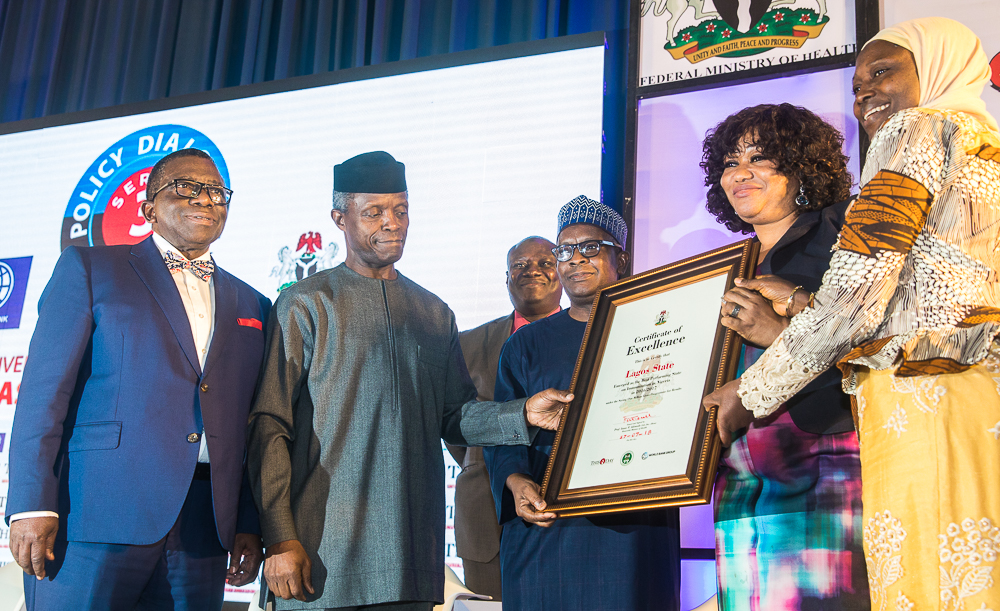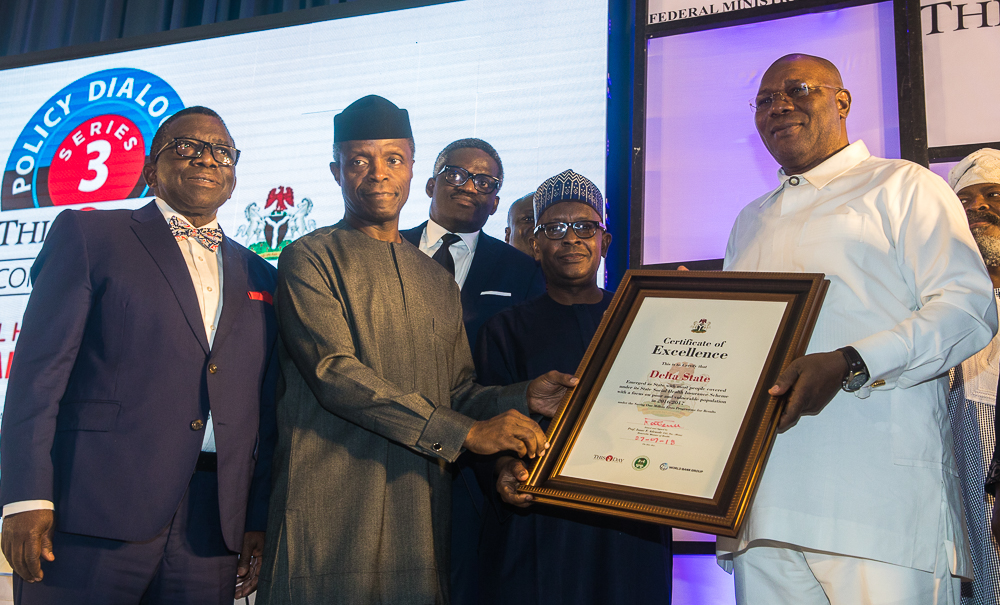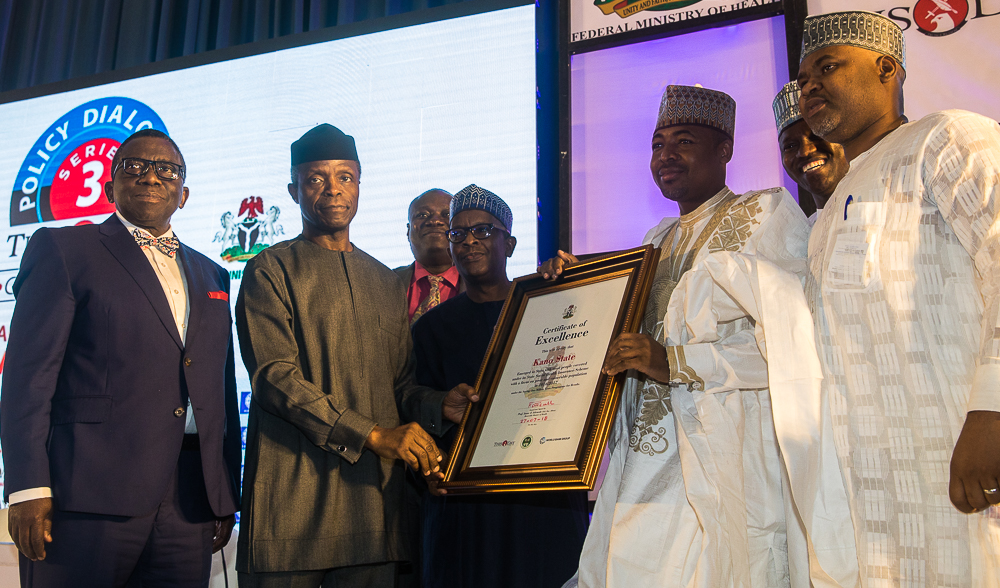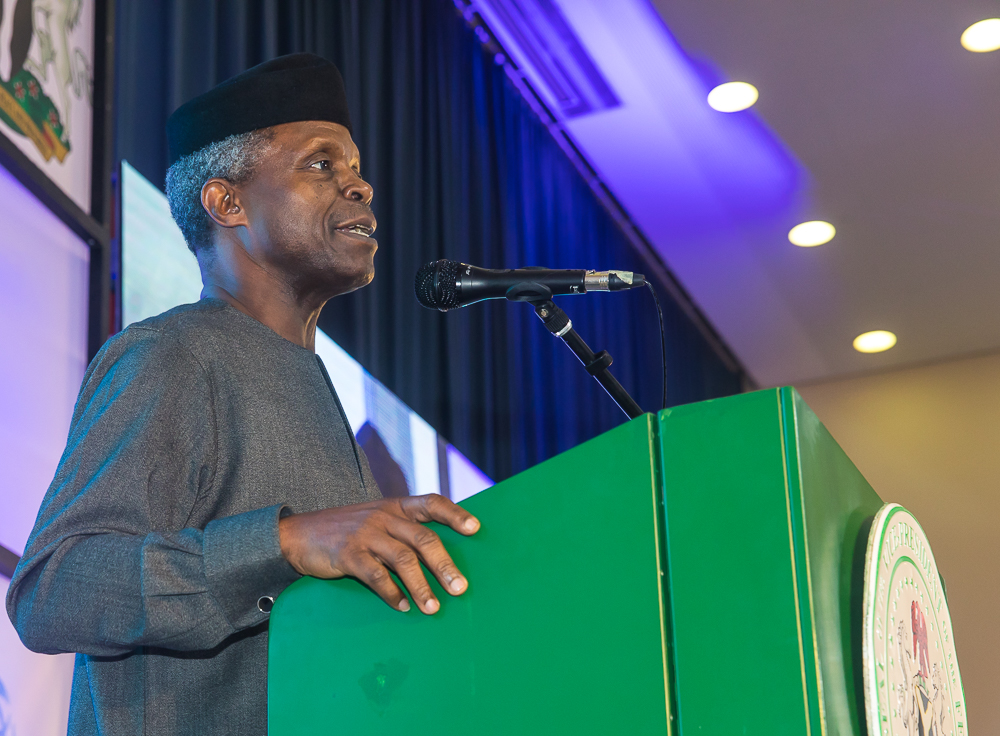THISDAY Policy Dialogue Series Tagged: “Improving Nigeria’s Health Outcomes In Numbers”
Beyond Budget, FG To Pursue National Insurance Scheme For Healthcare Funding
“But the National Health Insurance Scheme is a very important one in order to be able to provide the funding that our healthcare services desperately need.” – Vice President
REMARKS BY HIS EXCELLENCY, PROF. YEMI OSINBAJO, SAN, GCON, VICE PRESIDENT, THE FEDERAL REPUBLIC OF NIGERIA, AT THE THISDAY POLICY DIALOGUE SERIES TAGGED: “IMPROVING NIGERIA’S HEALTH OUTCOMES IN NUMBERS”, IN ABUJA, ON FRIDAY, JULY 27, 2018.
Protocols
It is indeed my pleasure to be here with you all, at this very important policy dialogue, the third in its series and one, which focuses on program implementation. This particular dialogue provides a platform to honour high performing States and hold State governments to some extent, accountable for health service delivery.
I have followed with keen interests, the developments in the healthcare sector since the beginning of our administration, given the importance of health outcomes in national development and our party’s mandate. On this note, I’m pleased to say that the numerous initiatives being implemented will help our country meet the goal of achieving Universal Health Coverage (UHC) by the year 2030.
One of these initiatives is the “Saving One Million Lives Program for Results (SOML PforR)”, which provides incentives based on achievement of results (health outcomes), while helping to drive the institutional processes needed to achieve them.
These incentives, which are Federal Government bulk grants to States based on performance, enable us to reward improvements in health outcomes achieved, rather than a focus on inputs or activities. For decision makers like us and many other present here today, the use of measurable indicators to track success, strong accountability mechanisms put in place and the alignment with the private sector to spur innovation in health care delivery, make this particular program worthwhile and result-oriented.
I’m aware the program receives the highest possible political attention at the State level, evidenced by the charge from State Governors to Health Commissioners, to focus on data in their respective States and conduct bottleneck analysis, and develop plans that will improve indices in their respective States.
This policy dialogue presents a platform for the best performing States to be rewarded. It is worthy of note that the Programme does not recognize political affiliation in line with its implementation policy, rather it provides equal opportunity for all the States. Otherwise, you would have seen today that the best performing States would only have been APC States. Let me say to my colleagues in the PDP States, they see how fair-minded and even-handed we have been.
To Nigerians, SOML-PforR means that the Primary Healthcare Clinics or Centres near them will be functional, that they will receive quality healthcare when they visit these centres, that the staff will be adequately trained and better motivated and thus be more competent, courteous and effective, that their children will no longer suffer and/or die from vaccine preventable diseases, that they will have fewer episodes of malaria and will be better treated if they do get malaria, that mothers will be able to determine how many children they want to have, space out these births as they want, and will no longer die during childbirth from simple complications.
Given that SOML-PforR publishes results on all the selected indicators, we have begun to see a change in the social contract between citizens and elected officers at the State level, as more people are increasingly holding them responsible for poor performance.
I’ll encourage every State to make good use of the SOML-PforR resources. Under the program, States that fail to make judicious use of the funds will miss out on future disbursements, but beyond that, good financial practices and efficient utilization of resources will improve living standards of large numbers of our people, and move us closer to our goals of achieving Universal Health Coverage.
As I draw to a close, let me use this opportunity to inform participants present, as part of the numerous health initiatives at the Federal level, and in line with Mr. President’s agenda, that we will commence the implementation of the Basic Health Care Provision Fund (BHCPF).
As you all know, funds have been included in the 2018 budget for the implementation of the Basic Health Care programme. It is a key deliverable of our administration, as we recognize the importance of human capital in spurring economic growth and development.
With the Basic Health Care Fund, we aim to provide a transparent and efficient structure for the inter-fiscal transfer of resources, through implementing agencies to the service delivery points which are the Primary Health Care Facilities.
These funds will be used in purchasing an explicit, but guaranteed package of high impact maternal and child health services, while improving the quality of healthcare delivered at the facilities. We do not envision that funds will be kept in any account, but rather disbursed swiftly to provide the much-needed services to the rural poor. Every beneficiary will receive an identification card, with a unique code to enable us to accurately determine the number of people benefitting from the program.
I am personally excited about the possibilities of the Basic Health Care Fund and I will encourage all our partners to contribute to the fund.
Your Excellencies, our health care policies are aligned with all of our human development initiatives. So our Social Investment Programme also feeds into our overall health care policy. For example today, the Federal government provides one meal every day to over 8.2 million primary school children in public schools in 24 States so far.
One of the key objectives of the School Feeding Programme is to address malnutrition, which as you know, leads to both physical and mental stunting of young children.
Part of the School Feeding Programme is a deworming programme, where we ensure that children are periodically dewormed. Also, our cash transfer programme of 5000 a month to the poorest, also has a clear healthcare component.
In developing the social register from which these payments are made, (the template for the social register was developed for us by the World Bank), we take into account the number of members of the household who are in school and children who have been immunized, with a view to encouraging school attendance, school enrolment, as well as immunization. Generally speaking, our focus on lifting millions out of poverty feeds into the objective of reducing poverty induced health outcomes.
This year for the first time and pursuant to the National Health Act, we are providing in our budget, the statutory one percent of the Consolidated Revenue Fund. But budget funding alone will never be sufficient to provide the types of healthcare that we want for our people, and neither will it truly deliver the health outcomes that we desire.
It is important that we must bear in mind that budgeting no matter how much it is, will not be enough, because we simply do not have the resources. This is why it is important that we take seriously, the National Health Insurance Scheme. For us as a government, it is an important policy initiative and we intend to implement it. I am pleased to see that several States are already implementing State Health Insurance Schemes.
But the National Health Insurance Scheme is a very important one in order to be able to provide the funding that our healthcare services desperately need.
Let me use this opportunity to thank very much, first the publisher of Thisday Newspapers, Mr. Nduka Obaigbena, for providing such an important partnership in delivering this social good. I think that it is very important that newspapers, as well as our other partners, join in this effort. I will also make an announcement of the very large amount of money that Thisday Newspapers will be giving in dollars in particular (general laughter).
I must also thank the Honourable Minister of Health, Prof Isaac Adewole, for his stewardship and demonstration of leadership for the sector, and the World Bank for providing the facility, and also all our other partners for working with us closely and for remaining strong partners in our quest for improved healthcare for all of our people.
Finally, my appreciation also goes to all of those, who in various ways, have supported our healthcare system. It might not be useful to mention all of them, but I want to thank all of you for the help that you have given us at various times and especially for your comments and all of those who have continuously criticized our system because we know that it will only yield to better outcomes.
Thank you everyone, and may we have a very fruitful outing today.
“It is important that we must bear in mind that budgeting no matter how much it is, will not be enough, because we simply do not have the resources. This is why it is important that we take seriously, the National Health Insurance Scheme. For us as a government, it is an important policy initiative and we intend to implement it. I am pleased to see that several States are already implementing State Health Insurance Schemes.”








